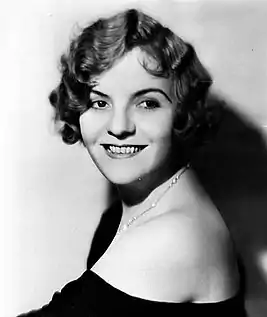Winnie Lightner
Winnie Lightner (September 17, 1899 – March 5, 1971) was an American stage and motion picture actress.[2] Perhaps best known as the gold-digging Mabel in Gold Diggers of Broadway (1929), Lightner was often typecast as a wise-cracking gold-digger and was known for her talents as a comedian and singer. She is also noted for introducing the song "Singin' in the Bathtub" in the 1929 motion picture The Show of Shows.
Winnie Lightner | |
|---|---|
 | |
| Born | Winifred Josephine Reeves September 17, 1899 Greenport, New York, U.S. |
| Died | March 5, 1971 (aged 71) Sherman Oaks, California, U.S. |
| Resting place | San Fernando Mission Cemetery, Mission Hills, Los Angeles County California US[1] |
| Years active | 1922–1934 |
| Spouse(s) | George Holtry John Patrick William Harold Roy Del Ruth (1934-1961) (his death) 1 Child Thomas Del Ruth |
Life and career
Born Winifred Josephine Reeves[3] was born in Greenport, Suffolk County, New York (on Long Island) but was raised in Manhattan's Hell's Kitchen by her aunt and uncle, Margaret and Andrew Hansen, and known as Winifred Hanson.[4][5]
She had a successful career in vaudeville and finally made it to Broadway, where she performed in George White's Scandals of 1922, 1923, and 1924, in the musical revue Gay Paree in 1925 and '26, and in Harry Delmar's Revels of 1927.[6]
She was the first movie performer in history ever to be censored for what she said or sang on screen rather than for anything she did visually. In 1928, she made a Vitaphone short in which she sang "We Love It", "God Help a Sailor on a Night Like This", "That Brand New Model of Mine", and "We've Got a Lot to Learn." A censorship board in Pennsylvania held the release of the film because of the content of Lightner's songs. According to film historian Alexander Walker, "Warners asked the censors to merely pass judgment on the visuals – the censors refused."
The musical Gold Diggers of Broadway was a 1929 triumph, and made her a star. Warner Bros. quickly signed her up for a number of musical comedies. The first of these was Hold Everything, a lavish all-Technicolor feature based on a Broadway hit. This was followed by She Couldn't Say No (1930), in which Lightner was cast in a maudlin dramatic role which did not suit her talents. The picture, consequently, was not very successful. This was followed by another successful picture,The Life of the Party, which was also shot entirely in Technicolor and was an even bigger hit than Hold Everything.
By the end of 1930 audiences had grown tired of musicals, while Lightner was in the process of shooting three musicals: Sit Tight (1931), Gold Dust Gertie (1931), and Manhattan Parade (1932). They were all released with most of the music cut. This was especially noticeable on Sit Tight and Manhattan Parade, on which even the background music was completely removed. In response to the change in public taste, Warner Bros. decided to try another dramatic role for Lightner; the result was a picture called Side Show (1931) which proved to be unsuccessful. She appeared in two more comedies, in which she co-starred with Loretta Young – without songs – before she left Warner Bros. In the first of these, Play-Girl (1932), she was billed with her name above the title, but in the second, She Had to Say Yes (1933), Young received star billing.
After this, Lightner left Warner Bros. to go freelance. She played as a supporting actor in two more features, for MGM and Columbia Pictures respectively, before retiring in 1934.
Family
Lightner was the mother of multiple-Emmy-award-winning cinematographer Thomas Del Ruth and was married to film director Roy Del Ruth until his death in 1961.[7] She died in 1971, aged 71, and was interred in the San Fernando Mission Cemetery.[1]
Filmography
| Year | Title | Role | Notes |
|---|---|---|---|
| 1929 | Gold Diggers of Broadway | Mabel | |
| 1929 | The Show of Shows | Performer in 'Pingo Pongo' & 'Singing in the Bathtub' Numbers | |
| 1930 | She Coundn't Say No | Winnie Harper | |
| 1930 | Hold Everything | Toots Breen | |
| 1930 | The Life of the Party | Flo | |
| 1931 | Sit Tight | Winnie | |
| 1931 | The Stolen Jools | Winnie | Short |
| 1931 | Gold Dust Gertie | Gertrude 'Gertie' Dale | |
| 1931 | Side Show | Pat | |
| 1931 | Manhattan Parade | Doris Roberts | |
| 1932 | Play Girl | Georgine Hicks | |
| 1933 | She Had to Say Yes | Maizee | |
| 1933 | Dancing Lady | Rosette LaRue | |
| 1934 | I'll Fix It | Elizabeth | (final film role) |
See also
 Biography portal
Biography portal Film portal
Film portal
References
- Celebrities in Los Angeles Cemeteries
- Winnie Lightner bio allmovie.com Retrieved July 1, 2015
- "Film Celebrities Begin Honeymoon". Spokane Daily Chronicle. August 16, 1948. p. 12. Retrieved August 6, 2016.
- Arnold Shaw (30 November 1989). The Jazz Age: Popular Music in the 1920s. Oxford University Press. pp. 236–. ISBN 978-0-19-536298-5.
- Joseph F. Clarke (1977). Pseudonyms. BCA. p. 103.
- Winnie Lightner at the Internet Broadway Database
- "WINNIE LIGHTNER, 71, OF STAGE AND FILMS". The New York Times. March 6, 1971. Retrieved August 13, 2018.
Further reading
Lightner, David L. (2016) Winnie Lightner: Tomboy of the Talkies. University of Mississippi Press. ISBN 978-1496809834.
External links
| Wikimedia Commons has media related to Winnie Lightner. |